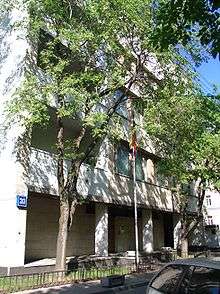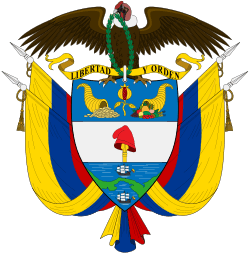Colombia–Russia relations
Colombia–Russia relations refers to the bilateral and foreign relations between Colombia and Russia. Diplomatic relations between Colombia and the USSR were established for the first time on June 25, 1935 (then severed on May 3, 1948, and restored back to normal on January 19, 1968). Colombia has an embassy in Moscow and Russia has an embassy in Bogotá.
 | |
Colombia |
Russia |
|---|---|
Today

On October 3, 2008, Colombia, considered one of the closest U.S. allies in Latin America, sent its defense minister to Russia for the first time to discuss signing a new military cooperation accord. Defense minister (and future president) Juan Manuel Santos arrived in Russia on Oct. 6 to attend an Interpol police conference and meet with his Russian counterpart Anatoly Serdyukov, along with Colombia's Ambassador to Russia, Diego José Tobón Echeverri.
Alquin "is the first Colombian defense minister to make an official visit to Russia, which is of major significance for relations between the two countries", the Colombian presidency said on its web site. Talks focused on cooperation in fighting the drugs trade, terrorism and a new defense accord, it said.
Colombian Vice-President Francisco Santos said during a visit to Russia in June that his country wants to buy fighter and transport helicopters and radar systems as it broadens its sources of defense equipment. The defense minister will attend a demonstration of Russian weaponry during his week-long visit, the presidency in Bogota said. Colombia's efforts to court Russia came after it voiced concerns about billions of dollars in Russian arms sales to neighboring Venezuela, where President Hugo Chávez proclaimed a goal of countering U.S. influence in Latin America and was accused by Colombia of arming FARC rebels.[1]
On November 1, 2013, the Colombian Air Force intercepted two Tu-160s of the Russian Air Force that were flying over Colombian airspace without previous governmental clearance. The two blackjacks, as code named by the NATO, were escorted out of Colombian airspace soon after and a note of protest was sent by the Ministry of Foreign Affairs of Colombia to Moscow.[2]
References
- "Archived copy". Archived from the original on 2008-09-22. Retrieved 2008-10-04.CS1 maint: archived copy as title (link)
- "International News | World News". Abcnews.go.com. Retrieved 2016-10-22.

